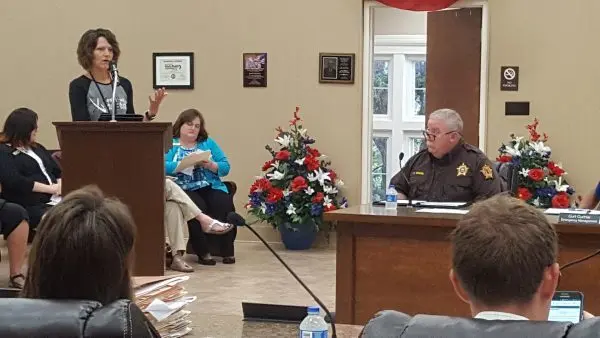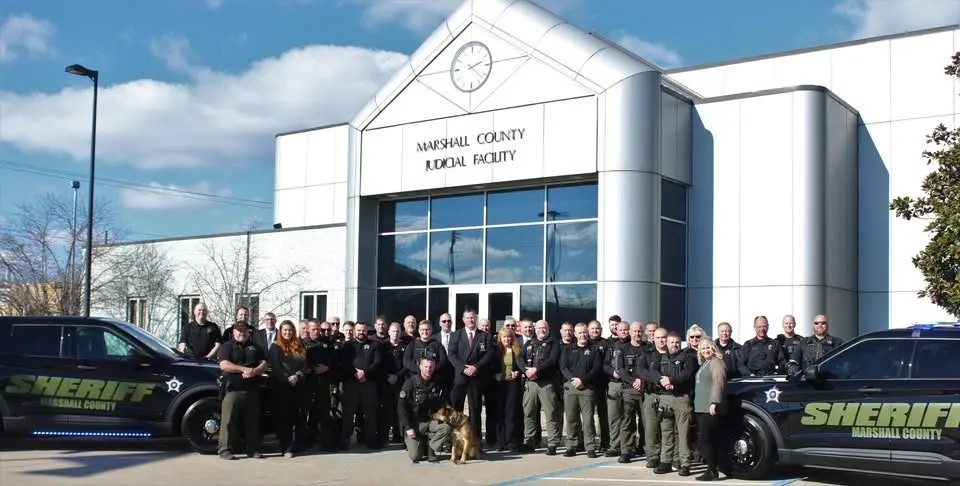
Members of the Marshall County Work Ready Community certification committee presented the annual update on the county’s status and progress toward recertification Tuesday during regularly scheduled fiscal court meeting in Benton. The committee, which brings together representatives from various agencies throughout the county – including Marshall County Public Schools, the Purchase Area Development District and Marshall County Adult Education – to maintain its Work Ready certification.
Marshall County was designated a Work Ready In Progress community in February 2015 and achieved certifcation in November that year as the 21st community in the state to do so. The WorkReady Community certification is a measure of the quality of workforce in a given area based on : high school graduation rates, educational attainment rate and broadband availability to demonstrate digital literacy.
The county must meet a number of educational benchmarks to earn and keep its status, however. Graduation rates must be at least 89 percent upon initial certification, and officials must have a plan in place to reach 98 percent by 2020, according to Work Ready Kentucky. Some 25 percent of the working age population must hold two-year degrees with plans in place to reach 32 percent within the first three years and 39 percent within five. Communities are also required to have plans in place to reduce the number of working-age adults without a GED or high school diploma.
Jillian Henson, director of Marshall County Adult Education, said staff is focusing on college and career readiness among adult students.
“Primarily before, a lot of our focus was: Get the GED, get them that certification,” Henson said. “Right now we’re focusing on, once people get their GED with us, trying to transition them on to something else. Being work ready, whether that means career certifications or maybe moving on to community college or college or things like that. So, our focus is streamlined with getting people their educational skills, but now it’s kind of broadening – as all work ready is – to try and help them move on to something bigger and better to focus more toward the future.”
Marshall County Adult Education serves about 200-300 residents in the community each year, Henson said. In 2016, some 26 residents earned GEDs through the center; 40 earned National Career Readiness certificates; about 80 achieved skill improvement levels and about 10 people transitioned from GED to postsecondary education, Henson said.
According to Census data on file with PADD, those initiatives could be working. The number of residents without a high school diploma or GED decrease from 13 percent in 2015 to 11.7 percent. The number of residents with National Career Readiness Certificates increased from 3.44 percent to 6.71 percent, according to the PADD data.
The county has gained in other areas, as well. Students at the high school level last year tested a 96 percent pass rate on the WorkKeys exam, an assessment that measures a students career readiness. Marshall County Schools Instructional Supervisor Ledonia Williamson said that rate would likely not happen this year, however, as grant availability to the state for WorkKeys testing had been pulled. Williamson said exam costs totaled about $9,000 per year for the WorkKeys, prohibiting districts from administering assessments to seniors. However, Williamson said the district was working on other methods to ensure proper student education.
“I can assure you that our students will be work ready, because we’re doing a lot of other things to make sure that that happens,” Williamson said. “Our focus has changed to work readiness among students from kindgarten through 12th grade. … We’re not going to lose our academic focus, but we’re also putting a lot of skills, we’re making those our priority currently. Because we know that a lot of former graduates from Marshall County schools have come through with maybe a poor GPA but are very successful citizens, and that is our focus, on making every student feel successful at school, not just those who are making As.”
PADD Special Projects Coordinator Mary Anne Medlock said the county was on track to earn its recertification, though she expects the program to shift somewhat in the state. In particular, she expected WorkKeys assessments – which allow students to earn NCRCs – and related requirements to change, as funding for those assessments had gone dry.
“I really think that the changes in the program that we’re going to hear about in the next few months will move away from this,” Medlock said. “One of the concerns has been from the state, is the fact that there are counties who have been in the Work Ready Community program for the past five, six years who have still not met their required rate, and perhaps it is not a true judgment of work aptitude. … So, they are going to do something different.”
Medlock said she felt the state would consider industry input on that testing when re-evaluating criteria of the program.
“I think that the state is listening to companies across the Commonwealth about whether or not they’re even using WorkKeys,” Medlock said. “In Marshall County, despite the fact that you’ve got the chemical industry, really only one, if not two companies out of the 14, 16 actually use WorkKeys. So, that in itself is a pretty big indicator. And of course, the Work Ready Community program actually started with ACT as a way of selling WorkKeys.”
Still, the county is making steady progress in its efforts. When the county was initially certified, 3.44 percent of residents held NCRCs; that number had grown to more than 6 percent, Medlock said. In addition, the most recent data indicate educational attainment rates had increased as well. When the county filed for Work Ready Community certifcation, 26.7 percent of residents aged 25-64 held at least two-year degrees, a number already higher than the required 25 percent; that percentage has increased to 27.8 percent.
High school graduation rates are also on par with necessary growth, Medlock said, with 92.9 percent of county students graduating, above the initial 92.7 percent at the time of certification.
The court also heard from Marshall County Public Library Director Kristi Tucker on the library’s 2017 tax rates. Tucker said the library board had adopted a 9.4 cent tax per $100 of assessed value on real estate property in the county, and a 9.65 cents per $100 of assessed value on personal property for the year.
Tucker said the board took the compensating rate on personal property, which actually decreased from 9.7 cents last year but would generate the same funding for the library system. Rates remained the same on real estate, however, though the compensating rate would have decreased to 9.3 cents per $100.
“We stayed at 9.4 (cents) in preparation of this building project,” Tucker said. “… We were scared to not … we didn’t get the grant that we applied for, so that scared me a little more. But we’re excited about the project getting ready to start.”
Design work on the project, a new building to house the Benton branch of the library, is already under way, with CMS Architects in Benton overseeing completion. The building is expected to be about 31,000 square feet and two stories; the new branch will be located on West 12th Street. Tucker said architects expect to break ground on the new facility in January.
In other business, the court:
- declared Sept. 5, 2017, as Agnes Rose Nimmo Day in the county, in honor of Agnes’ Nimmo’s 100th birthday;
- approved a resolution authorizing Judge-Executive Kevin Neal to sign documentation related to loans from the Kentucky Infrastructure Authority for the purpose of making Sanitation infrastructure upgrades in the county;
- approved building lease agreements with the Marshall County Rescue Squad;
- approved a pay increase to $15.18 per hour from $12.33 for park grounds maintenance personnel who completed probationary period;
- approved new hire pay of $12 per hour for a new full-time deputy jailer;
- approved a new hire pay of $11.50 for the county attorney receptionist position; and
- approved a $15,115 bid for 22 body armor vests for the Marshall County Sheriff’s Department, which will be funded largely through a Homeland Security grant awarded to the county in August.
Full video of Tuesday’s meeting can be viewed here.







